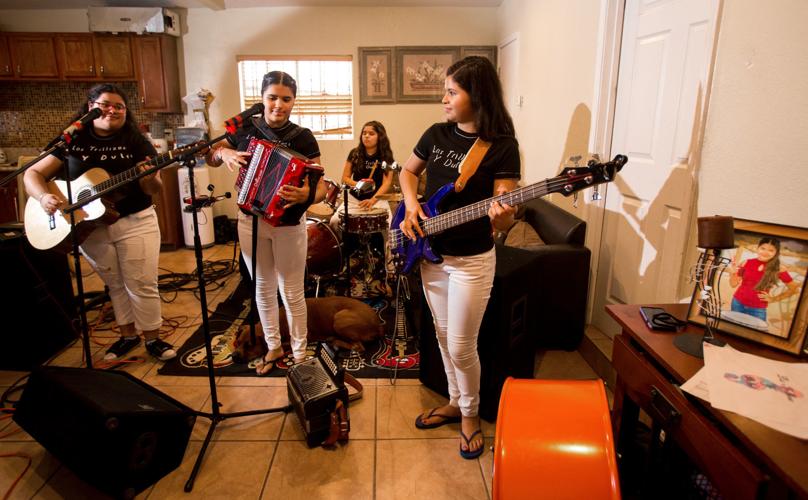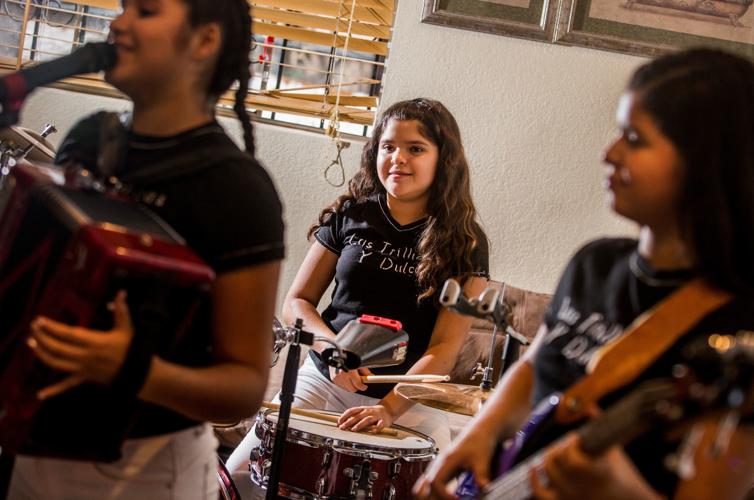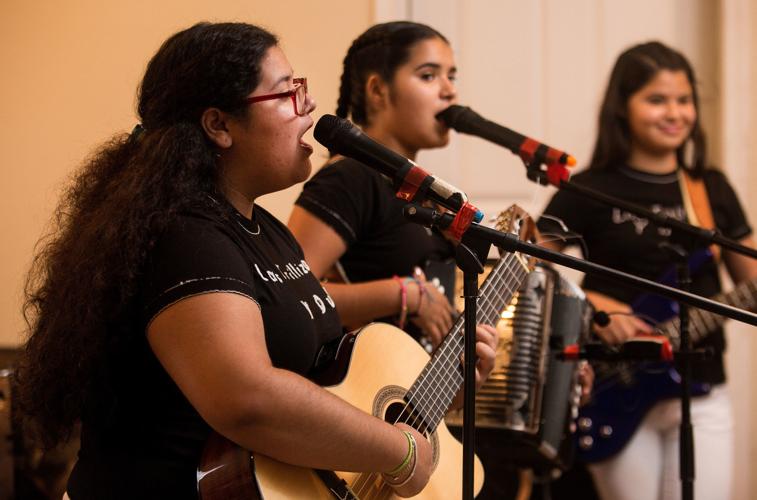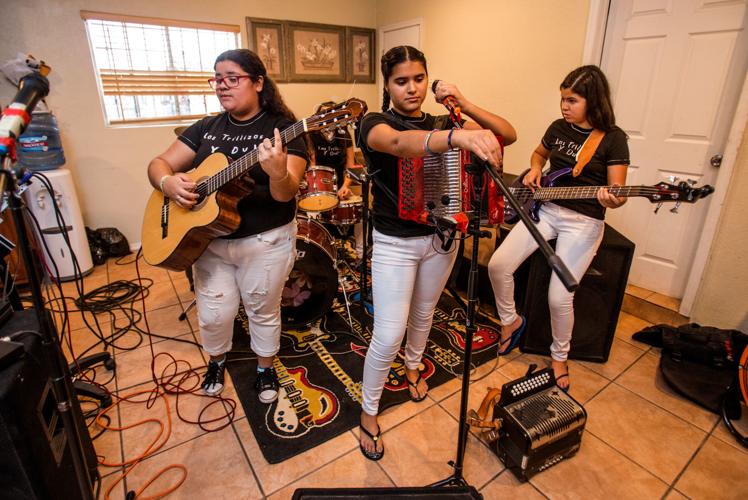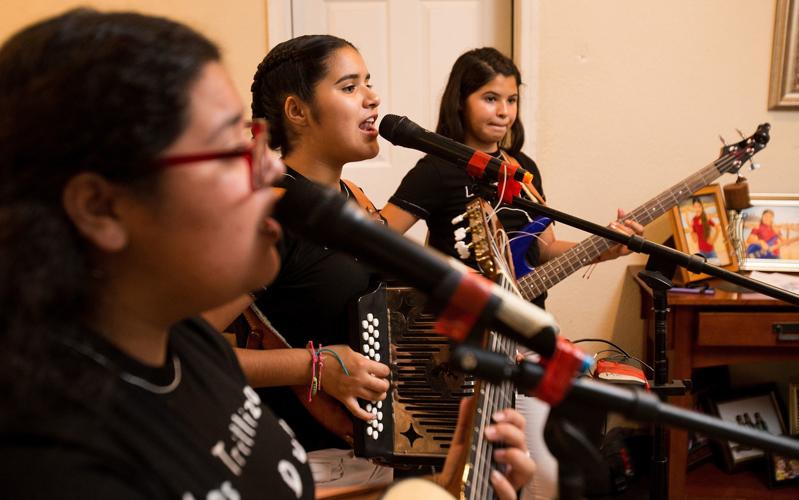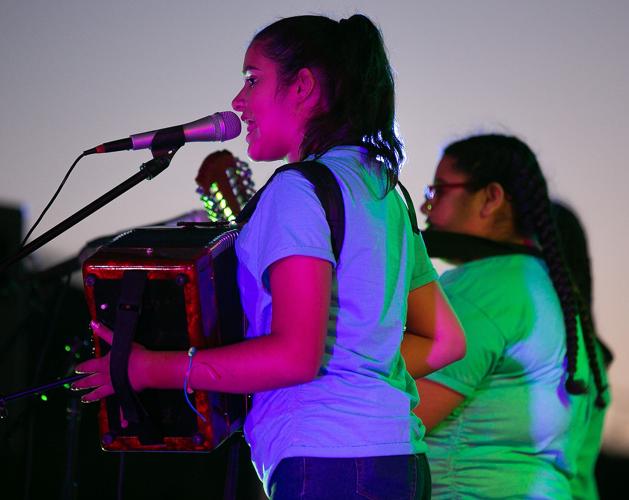The taka taka sounds bounced around the small living room as the four-piece band launched into a springy norteño tune. The drummer, the bassist, the accordionist and the guitarist marched in unison in a song of the borderlands.
It was rehearsal for the quartet, which has been performing together for less than three years.
But in that short time the foursome has performed in Tucson and in various cities and towns in Sonora, Mexico. The band even recorded in a studio in Hermosillo, Sonora’s capital, a compact disc that was released in May and sold in the band’s tocadas.
Meet Las Trillizas y Dulce, made up of 12-year-old sisters Yisbel, Jhanderlin and Sheyla Noriega — who are triplets (“trillizas” in Spanish) — and their friend, Dulce Saenz, who is 14.
“They’re really serious,” said Norma Saenz, mother of Dulce, who was playing the guitar at a recent rehearsal but usually plays the bajo sexto, a 12-string bass guitar. Yisbel plays the accordion. Jhanderlin sits at the drums. And Sheyla is on the bass. In addition to norteño, Yisbel and Sheyla play saxophone and Jhanderlin plays flute at school.
Next month the triplets will enter Apollo Middle School.
Given their age and short time together, the girls play some serious norteño and cumbia music, the kind that is frequently heard at parties, quinceañeras, dances, at the swap meet and festivals, like last month’s Día de San Juan Festival on Tucson’s west side.
“They have melded well together,” the triplets’ father, Francisco Antonio Noriega, said in Spanish. He’s a car mechanic who doubles as the band’s sound man.
The girls don’t read music, yet, although they are taking lessons at a norteño music academy. They memorize their repertoire. Norteño music is learned by rote.
“They have learned fast,” said David Quevedo, director of the Academia Norteña, where the girls attend lessons twice a week. The girls also practice at the Noriegas’ south-side home.
Quevedo, who works with other youth groups out of his Midvale home, said the girls impress him with their enthusiasm and because they put a lot of ganas into their music. “They love music,” he said.
Their road began when the triplets, who were 9 at the time, were at a festival where norteño music was heard. One of the girls told her parents she wanted to join them. The two followed.
That led the girls to a music school and then to the academy where they met Dulce, who was already a “seasoned” musician who plays the violin as well. She was in Mariachi Las Pumas at Roskruge Bilingual K-8 School.
“I’ve always loved it,” Dulce, a student at the Pima Performing Arts High School, said about her affair with music. But she’s also motivated by another powerful force, one that often affects pre-teens and teenagers.
“It gives me something to do when I’m bored,” she said.
But the girls are rarely bored. They don’t have time. They perform frequently and when they travel to Sonora, they spend a lot of time in the large van that’s otherwise parked outside the Noriegas’ home near South 12th Avenue and West Nebraska Street.
What started as something fun to do, a hobby, practicing and performing has become more a focal point in the girls’ lives. They enjoy playing in front of audiences and hearing the applause. They have come to appreciate the inner secret of being a musician.
“I like to feel the music. I feel the music inside me,” said Jhanderlin.
As much as the girls focus on their music, they do have time to just be young girls, said the triplets’ mother, Isabel Noriega. “After they rehearse, they go play with their dolls,” she said.
But there is something more afoot in the girls’ musical growth. They are continuing a long tradition of keeping alive borderlands’ culture and music. The girls are beginning to understand their role, and the role that music plays in their lives.
Sheyla said, “It makes me feel Mexican because all my family is Mexican.” To which Yisbel said, “It makes us proud of ourselves.”
The pull and pride of cultural identity through the music fills the girls with confidence they otherwise might not have found. They know that they are growing up in a male-dominated musical world. They’re confident that they can overcome gender bias.
“We can inspire other girls that they can do this,” Dulce said.


